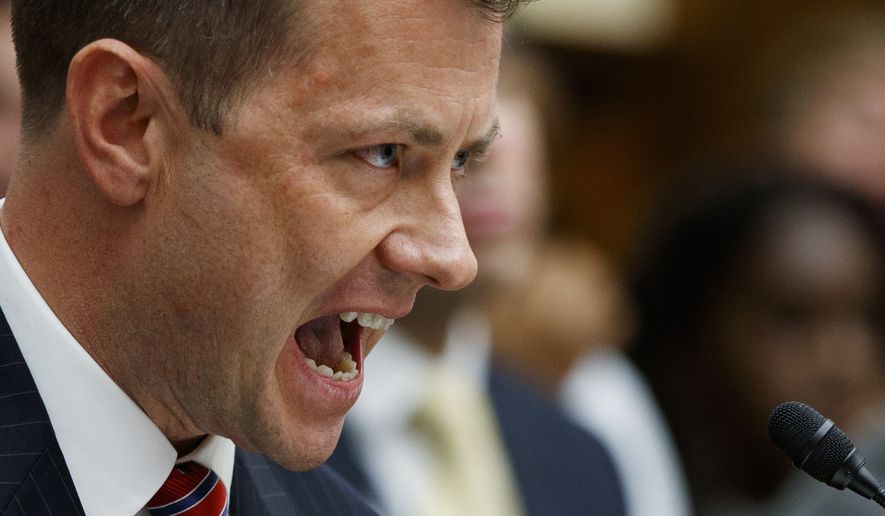OPINION:
Peter Strzok hit the jackpot last month. The former FBI agent who opened a baseless investigation of then-candidate Donald Trump will receive $1.2 million from taxpayers, and his erstwhile paramour, former senior FBI lawyer Lisa Page, will collect $800,000.
The Department of Justice agreed to the payout in partial settlement of a lawsuit the duo never would have won, and the parts of the lawsuit alleging violations of Mr. Strzok’s free speech and due process rights remain unresolved.
The sweetheart deal raised eyebrows in Washington. At a recent hearing on the attempted assassination of Mr. Trump, FBI Deputy Director Paul Abbate said he had no idea who was responsible for approving it.
Sen. John Kennedy was not satisfied with the evasive response. “Someone had to agree to it,” the Louisiana Republican said. “I’ve settled lawsuits. The client has to agree to it. You’re the client.”
According to Mr. Kennedy’s office, the FBI has not followed up with an answer to the senator’s question. It’s a particularly relevant inquiry, considering the central role Mr. Strzok and Ms. Page played in implementing the bureau’s plot against the former president.
In July 2016, Mr. Strzok opened what he called “Crossfire Hurricane,” authorizing the unprecedented spying on Mr. Trump’s campaign through an “electronic communication” that Mr. Strzok sent himself.
Self-approval kept the FBI’s upper echelon out of the paper trail; Mr. Strzok was only a midlevel executive. An attempt by Judicial Watch to reveal the higher-ups involved was rejected by a federal court in Washington.
It’s worth getting answers, given Mr. Trump’s possible return to the White House. Several figures involved in the scandal are still working for the administration, even though Crossfire Hurricane tainted everyone involved. As DOJ Inspector General Michael Horowitz put it, “I think the activities we found here don’t vindicate anybody who touched this.”
The settlement applies only to the privacy aspect of Mr. Strzok’s complaint, which argued that the public disclosure of a subset of the 19,000 text messages sent by him and Ms. Page has brought him into disrepute.
The 2016 text saying “we’ll stop” candidate Trump from being elected was enough to seal the agent’s fate. In DOJ’s words, it “gave rise to the implication that [Mr. Strzok] was willing to take official action to impact a presidential candidate’s electoral prospects.”
In firing Mr. Strzok, then-FBI Deputy Director David Bowdich explained, “In my 23 years in the FBI, I have not seen a more impactful series of missteps that has called into question the entire organization and more thoroughly damaged the FBI’s reputation.”
Since the messages were sent between government employees using government devices, there was no expectation of privacy. Even private emails aren’t always protected.
In the wake of the Enron scandal, the Federal Energy Regulatory Commission released every email sent by 151 of the company’s employees, including embarrassing notes revealing illicit romantic dalliances. The database of personal messages is so extensive that it is used to train artificial intelligence algorithms in how humans communicate over emails.
Not all of Mr. Strzok’s communications have been released, as officials have deliberately held back relevant messages — a handful of which surfaced during special counsel John Durham’s investigation, which was closed last year.
Since Mr. Strzok’s lawsuit remains open, and another generous sue-and-settle payment is a possibility, the public has a right to know why the administration took this unusual step. Moreover, since we’ve paid $2 million for the privilege, let’s see the rest of the 19,000 texts.




Please read our comment policy before commenting.